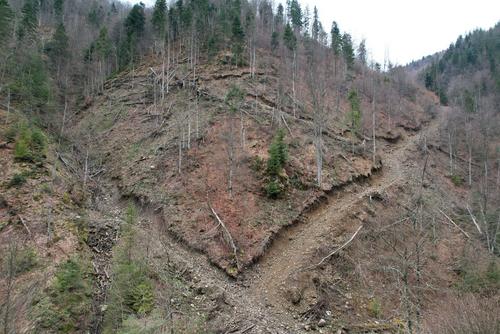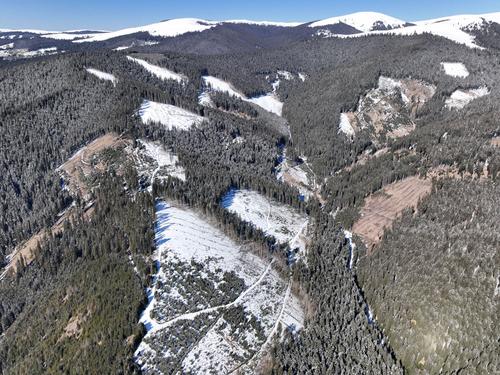A recent report by EuroNatur and Agent Green provides new evidence on logging in Romania's protected areas. Nature conservation organisations call for a moratorium on logging in Romania's primeval forests.

Maramures Natura 2000 site Repedea Valley: drone photo of new logging roads, taken in March 2023
© EuroNatur
Frumoasa Natura 2000 site Vidra dam area: drone photo of several clear cuts, taken in March 2023
© EuroNaturBucharest, Radolfzell. A recent investigative report reveals alarming findings regarding the ongoing exploitation of Romanian forests in Natura 2000 sites. The investigation covered 16 locations within the Maramures and Făgăraș mountains, Domogled, Frumoasa, and Barnova Natura 2000 sites, encompassing state-owned and private forests and four of which are subject to an infringement procedure by the European Commission. While the forests have an average age of 125 years, all analysed locations in these protected areas had active logging permits and/or active wood transports. From a small sample of logging permits (0.01% of all the logging permits in the Romanian public database) from these 16 locations, around 65355.89 m³ of forests were allowed to be removed in 2022 and 2023. This is equivalent to 420 football fields and does not include illegal logging.
The report, compiled by leading environmental organisations, EuroNatur and Agent Green, highlights the urgent need for improved management plans, impact assessments, and transparency in how decisions are being made to cut down protected forests. Furthermore, the report calls for a moratorium on logging in protected areas until the Romanian government can make the necessary improvements to forest management that align with the conservation objectives of Natura 2000 sites and EU environmental laws.
“Europe still has wild forests, and Romania's unique and irreplaceable natural heritage is at risk due to the government’s lack of interest in protecting it,” says Bruna Campos, Senior Policy Manager at EuroNatur. “Swift action is needed to stop logging and protect these primary and old-growth forests of Romania.”
Environmental Impact Assessments (EIA) and Appropriate Assessments (AA) are essential for evaluating the impact of logging operations on protected species and habitats, as required by the European Union. Shockingly, out of the 16 sites analysed, only one had an EIA, and its quality was notably inadequate, failing to consider the presence of a critically endangered fish species, Romanichthys valsanicola.
The investigation identified progressive logging as the most widespread and damaging logging type, resulting in barren landscapes reminiscent of clear-cuts. This practice has raised concerns about the conservation status of previously intact habitats and old-growth forests, which are vital for biodiversity.
One of the major concerns raised in the report is the lack of transparency surrounding forest activities that should be accessible to the public. Forest Management Plans (FMPs), crucial for monitoring and management, have been heavily censored, with vital information such as parcel descriptions, logging proposals, and detailed forest maps often removed. Furthermore, accessing FMPs on private land has proven challenging due to missing information in the government's forestry database.
“Forest inventories and logging plans are the basis for transparency. There is a final court ruling that all private and state inventories should be public, and the Romanian government still chose secrecy of this data. Therefore, public cannot properly participate in any decision-making or monitoring,” says Gabriel Paun, CEO of Agent Green.
Despite efforts to address the issue, the Romanian government's response has fallen short. The recent Emergency Governmental Ordinance 177/2022 (EGO 177/2022) failed to address existing logging permits and only sets a deadline of September 2023 for starting the process of completing Appropriate Assessments (AAs) of Forest Management Plans (FMPs). Moreover, logging continues unabated, disregarding legal requirements.
The NGOs are calling for comprehensive environmental impact assessments and appropriate assessments for all FMPs, along with revising national legislation regarding logging practices and including all forests within Natura 2000 sites in the national inventory.
The organisations behind the report recommend implementing a moratorium on logging in protected areas until all FMPs and logging permits are reassessed following environmental assessments. They emphasise the necessity of aligning Romanian forest laws with EU environmental regulations to protect the conservation objectives of Natura 2000 sites.
Background information:
- In Romania there are more than 500,000 hectares of potential primary and old-growth forests, more than in any other EU Member State (with the exception of Scandinavia). Approximately 300,000 hectares of potential primary and old growth forests are protected by European laws as Natura 2000 sites. Many protected species, such as bears, wolves, black storks, owls, woodpeckers, bats and beetles are dependent on these forests.
- The campaign "SaveParadiseForests" is pushing for the protection of the primary and old-growth forests of the Carpathians, particularly in Romania. It is being jointly coordinated and carried out by the NGOs EuroNatur (Germany) and Agent Green (Romania).
- Link to the report: https://www.euronatur.org/fileadmin/docs/Urwald-Kampagne_Rumaenien/Investigation_of_Romanian_forests_in_Natura_2000_sites.pdf
- In a report from last last year we have identified the areas most affected by illegal activities. Take a look: https://www.saveparadiseforests.eu/wp-content/uploads/2022/02/Investigation-into-habitat-degradation-in-Natura-2000-sites_Feb-2022.pdf
Contact:
Christian Stielow, christian.stielow(at)euronatur.org, Tel.: +49 (0)7732 – 92 72 15
Catalina Radulescu, office(at)agentgreen.org, Tel.: +40745138165


